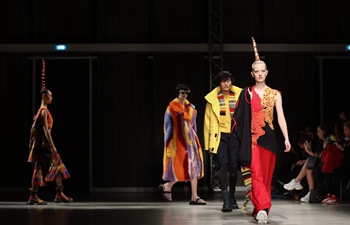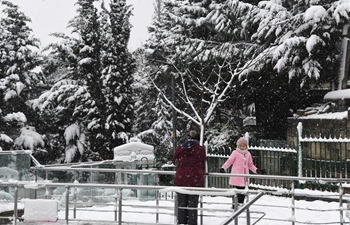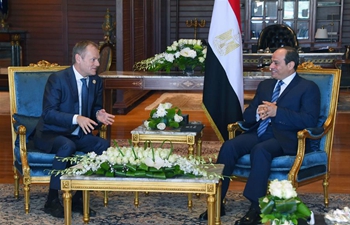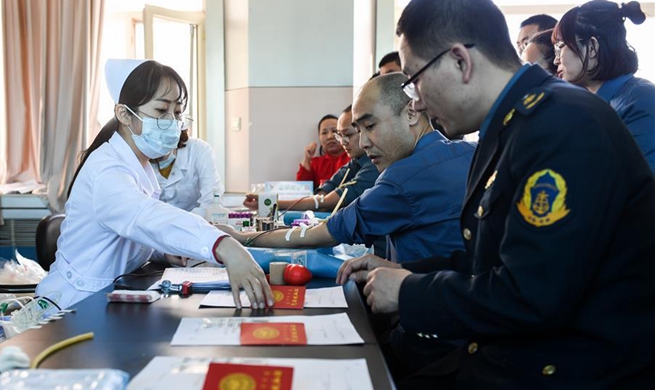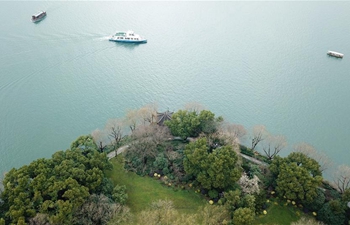RAMALLAH, Feb. 25 (Xinhua) -- Palestinians are seeking to gain political support for their cause from the first League of Arab States (LAS)-European Union (EU) Summit, which kicked off Sunday in Egypt's Sharm el-Sheikh city.
The summit, scheduled on Feb. 24-25, will address many political and economic issues, including the Palestinian cause and ways to achieve a comprehensive and just peace.
An EU statement said that the summit seeks to strengthen Arab-European relations, as leaders will address a wide range of current challenges and common opportunities, such as trade, investment, migration, climate change and security.
The summit will also provide an opportunity for leaders to discuss the latest developments in the region, such as the Middle East peace process and the situation in Yemen, Libya and Syria.
Palestinian Foreign Minister Riyad al-Maliki said that the summit came "in a very difficult period for all in general, and for the Palestinian issue in particular."
Al-Maliki told Palestine's official television that the summit must emphasize an integrated vision stemming from the Palestinian position on the need to hold an international peace conference to resolve the Palestinian-Israeli conflict.
He added that the summit "will strengthen the Palestinian position and send a clear and strong message to the U.S. and Israeli sides that the European and Arab countries meet to emphasize that the Palestinian cause is a central issue."
Communication Officer at EU in Jerusalem, Shadi Othman, said that the Palestinian cause will be among the top issues to be discussed during the summit.
"The summit aims at greater European and Arab consultations and coordination and the Palestinian issue is the central issue in enhancing the level of coordination," Othman told Xinhua.
He stressed that Europe "plays an important role in building the institutions of the Palestinian state and aspires to play a greater role in pushing forward the efforts to resolve the Palestinian issue, in addition to activating the Arab role and finding solutions to achieve peace."
The EU seeks a more active role in the peace process in light of the current stalemate and the absence of the political process as well as closing the horizon of the two-state solution and the facts imposed by Israel on the ground.
The Palestinians have been boycotting the administration of U.S. President Donald Trump since it recognized Jerusalem as Israel's capital and moved its embassy in Israel to Jerusalem in May 2018.
"The summit is very important for the Palestinians in light of the pressure practiced on the Palestinian leadership by the U.S. and Israel," said Ghassan Khatib, professor of political science at Birzeit University in Ramallah.
Khatib added that the Palestinian tools in the face of the U.S. and Israeli positions depend on the activation of the European and Arab roles, "especially since Europe has difficulties in the relationship with the U.S. under Trump."
He pointed out that the Palestinians aspire to strengthen Arab-European relations as an input to bring some balance with the extraordinary U.S. support for Israel.
"The participation of Palestinian President Mahmoud Abbas in the summit signals the interest in the summit and the aspiration to gain more political support for the Palestinian position," Khatib told Xinhua.
The LAS-EU Summit is being held while the Palestinians demand a multilateral international mechanism for the peace process away from the U.S. monopoly and the failure of the political process.
The Palestinians want the summit to be an occasion to reaffirm the resolutions of international legitimacy to resolve the Palestinian issue in accordance with the vision of a two-state solution.
The summit, held after the Warsaw Conference which was held recently under the U.S. sponsorship with the participation of Arab countries and Israel, is an opportunity for the Palestinians to emphasize adherence to the Arab Peace Initiative.
The Palestinians, who boycotted the Warsaw Conference, warned of the U.S. administration's attempt to bypass the Arab Peace Initiative at the expense of liquidating their cause and normalizing relations between Arabs and Israel.
According to the initiative, which was launched in 2002, Arab and Islamic normalization with Israel should happen after Israel ends its occupation of the Palestinian territories which has been going on since 1967 and after the establishment of the independent Palestinian state.
Israel rejected the initiative and has sought to establish relations with Arab countries without providing a solution to the Palestinian cause.
Writer and political analyst from Ramallah, Muhannad Abdul Hamid, said that the LAS-EU Summit is taking place at a sensitive stage in light of a clear change in the priorities of the Arab and Gulf regimes, especially by focusing on the Iranian file, which means a slight retreat of the Palestinian issue.
"There is a notable change in the priorities of many Arab countries because of the imminent Iranian threat which turned Israel into a partner in the confrontation," he told Xinhua.
"This means turning the Arab Peace Initiative upside down," the expert said.
He added that Trump's peace plan, which is called "Deal of the Century," seemed from the first moment as a counter strike to the Arab Peace Initiative.
"It is important for the Palestinians to strengthen the European role in the face of the U.S. monopoly on the peace process..." the analyst said.
"Hopefully the Sharm el-Sheikh summit will be an opportunity to strengthen the Arab role and international resolutions that recognize Palestinian rights," he added.





